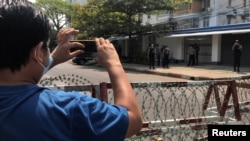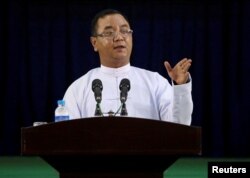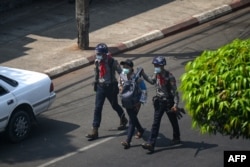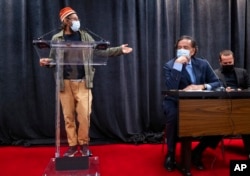Nearly two years into the military takeover in Myanmar, the climate for media is in an "abysmal state" experts say, with reporters forced to take big risks to report on opposition to the junta.
Beyond media licenses being revoked and news outlets moving into exile, Myanmar currently has more than 40 journalists in custody — including a contributor to VOA Burmese. At least two were killed this year while in custody of soldiers or police, rights groups say.
"The media situation in Myanmar has returned to the abysmal state it was in before the democratic transition started in 2011," according to Phil Robertson, deputy Asia Director of Human Rights Watch.
Citing bans on some media outlets and regulations that Robertson said are, in effect, "pre-publication censorship," the Bangkok-based expert said Myanmar is "literally back to where it was before."
"People [are] forced to listen to foreign radio broadcasts and seek for online outlets amid the increased shutdowns of the internet, especially in conflict areas," Robertson said.
One of those affected by the restrictive situation is The Irrawaddy, an outlet formed over 30 years ago by exiled Burmese living in Thailand.
When Myanmar moved to democratic rule, The Irrawaddy was able to work and legally share its news inside the country.
But in October 2022, the military council revoked The Irrawaddy's license alleging the outlet had been damaging "state security and rule of law" in its reporting.
Staff at the media outlet have bigger concerns.
"Right after the regime revoked our license, it ordered authorities to chase anyone who works for The Irrawaddy. So our reporters or citizen journalists or anyone who is associated with us, even our sources, are at high risk," Kyaw Zwa Moe, the outlet's managing editor, told VOA. "If they are found, they will definitely be arrested and given lengthy imprisonments."
This year, a court sentenced a former Irrawaddy photojournalist, Ko Zaw Zaw, to three years in prison for incitement. Another of its journalists is also detained.
Myanmar is now the world's third worst jailer of journalists, according to the New York-based Committee to Protect Journalists.
Most are held on charges under Section 505A, a provision the junta added to the penal code that criminalizes "causing fear, spreading fake news or agitating crimes against the government."
Major General Zaw Min Tun, the military spokesperson, has repeatedly dismissed concerns over the media environment.
The detained journalists were arrested "not for their profession but because of terrorist-related activities and instigation of unrest," he told VOA Burmese.
The spokesperson said that Aye Kyaw, one of the two journalists to die in custody, suffered a heart attack. Zaw Min Tun alleged the journalist was found with a gun and grenades when he was detained.
The general said no information or police report is available for Pu Tuidim, who was found dead after soldiers detained him and several others.
In response to military pressure, a group of independent media organizations issued a joint statement in September, contesting comments made by a member of the military-appointed Press Council, who said the country's journalists were "reporting false news and misinformation."
Citing high media arrests, revoking of licenses and the deaths of journalists in custody, the journalists' statement read: "The military council is suppressing independent media and journalists in Myanmar in many different ways, impeding the right to information and hindering freedom of the press and freedom of expression."
Robertson told VOA the junta is fighting to control media.
"The media environment is inherently compromised and that's not going to change in the short term because of the junta's actions and control. But importantly, we can expect that independent journalists will continue to operate, and stand up for truthful reporting," he said.
Kyaw Zwa Moe of The Irrawaddy said, "No independent journalists can work inside Myanmar."
"Under this brutal regime, which doesn't or can't appreciate any values of democracy, including press freedom, I don't think we can see any progress for journalists and there is no space for independent media either," he said.
The journalist told VOA that since the coup, most of his staff have left the country or gone into hiding.
The Irrawaddy is not the only outlet to move its reporting operations.
Frontier Magazine, an English-language publication, left Myanmar late in 2021.
Editor-in-chief Ben Dunant said that with a reduced presence on the ground, it's more difficult to get access to real-time information.
"Some of the challenges reporting remotely, contacting certain sources, getting people to talk to you, we're relying much more on anonymous sources," he said.
Dunant said that if people agree to speak with media, they are often reluctant to use their names, which creates a "problem in terms of the credibility."
"We're not there, so it's harder to reality check the situation and for security reasons you use more anonymous sources — but there's not really a way around that," he told VOA by phone.
The publication's staff are among those to be arrested by the junta. In 2021, authorities detained then-managing editor Danny Fenster — a journalist from the U.S. — for nearly six months.
Another of its journalists wrote a harrowing account of how soldiers detained, beat and raped him to force him to give up sources. The journalist said he was told if he stayed silent about the assault he would not be charged.
Dunant believes that Myanmar's crisis will not be resolved anytime soon and that journalists will remain at risk.
"The conflict has escalated, resistance has continued, and the regime has been more desperate and hardline in order to maintain control," he said. "I don't think it's going to be a safe environment for journalists in the near future at all, not for a good few years at least."
As of December 21, the Assistance Association for Political Prisoners, a monitoring group in Thailand, records at least 2,639 people killed by the junta since the coup. More than 16,500 are arrested and over 13,000 remain detained.
For Robertson of Human Rights Watch, the dire media environment reflects conditions across Myanmar.
"Media freedom, and freedom of expression are critically important for human rights in Myanmar, and their absence shows how bad the current state of affairs has become," he said.







